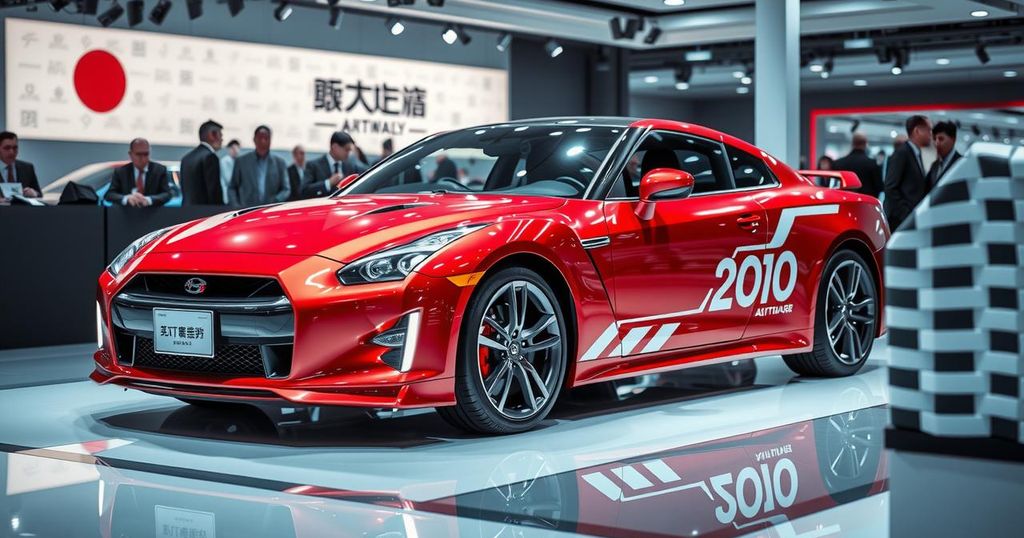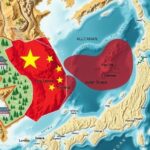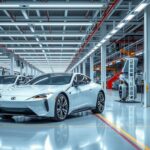Japanese Automakers Face Declining Sales in China’s Evolving Market
In 2024, Toyota, Honda, and Nissan reported significant decreases in vehicle sales in China, with Honda experiencing a 30.9% drop, while Nissan saw a 12.2% decrease. Their combined sales totaled 1.55 million units, far below the 3.1 million peak in 2019, indicating a pressing need for these manufacturers to adapt to the shifting market toward electric vehicles.
In a recent announcement, Toyota Motor Corporation, Honda Motor Co., and Nissan Motor Co. reported significant declines in their new vehicle sales in China for the year 2024. This downturn comes as the automakers, previously strong in gasoline-powered vehicles, face stiff competition in a market increasingly favoring electric vehicles. Honda recorded the steepest drop with a 30.9% decrease, selling 852,269 units and falling below the one million mark for the first time in nearly a decade. Meanwhile, Nissan’s sales decreased by 12.2%, totaling 696,631 units. Overall, the combined sales of these three manufacturers reached 1.55 million units, only about half of their peak of 3.1 million units recorded in 2019. With a production capacity nearing 3 million units in China, these companies may be compelled to close some of their manufacturing facilities.
The current Chinese automotive market presents unique challenges as the demand for electric vehicles (EVs) continues to surge. This environment has placed traditional automakers at a disadvantage, particularly those that primarily focus on gasoline vehicles. As stricter emissions regulations and governmental support for EVs become more prevalent, companies like Toyota, Honda, and Nissan must adapt their strategies to remain competitive. The decline in sales not only impacts their market performance but also raises concerns about their production capabilities in the region. The situation reflects a broader shift within the automotive industry, emphasizing the need for innovation and adaptation in response to changing consumer preferences.
No direct quotes were provided in the article.
The article provides insight into the sales performance of three renowned Japanese automakers—Toyota, Honda, and Nissan—in the highly competitive Chinese market. The steep decline in sales figures emphasizes the pressing need for these companies to recalibrate their strategies, particularly in light of the growing popularity of electric vehicles. The potential closure of manufacturing facilities raises significant questions about their future operations in this pivotal market.
Toyota Motor Corporation, Honda Motor Co., and Nissan Motor Co. have experienced pronounced reductions in their vehicle sales in China, underscoring a crucial shift in automotive consumer preferences toward electric vehicles. Honda emerged with the most dramatic decline, while both Nissan and Toyota have also reported significant drops in sales. Given their combined surge production capacity, the implications for operational adjustments, including potential plant closures, are substantial for these established manufacturers as they pursue a sustainable, competitive future in the transforming automotive landscape.
In recent years, the automotive industry has been undergoing a significant transformation, predominantly driven by a shift toward electric vehicles (EVs). China, as the world’s largest automobile market, has seen a rapid increase in demand for EVs amidst rising environmental concerns and government incentives. Traditional automakers, particularly those invested heavily in gasoline vehicles, such as Toyota, Honda, and Nissan, are now challenged to adapt to this evolving landscape. The recent sales declines highlight the urgent need for these manufacturers to innovate and adjust their business models to remain relevant in this competitive market environment.
The sales declines reported by Toyota, Honda, and Nissan in the Chinese market for 2024 indicate a critical juncture for these automakers. The significant shifts in consumer preferences toward electric vehicles necessitate a strategic reevaluation of their product offerings and manufacturing capabilities. As they face the prospect of closing plants due to reduced demand, the imperative for innovation becomes clearer, emphasizing the automotive industry’s ongoing transformation in response to environmental and market dynamics.
Original Source: www.nippon.com








Post Comment